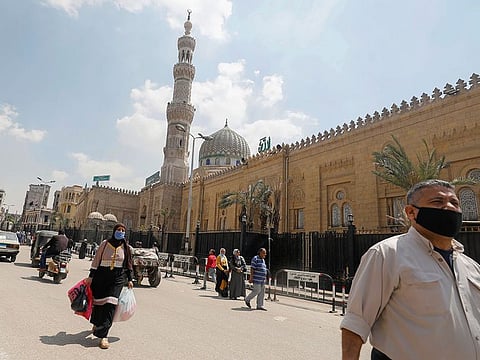Arabs must be at frontline fighting COVID-19
Let coronavirus be an opportunity for all nations to take stance against war and disease

Times of crisis, especially the kind that targets all of us regardless of race, religion or geography, often constitute a wake-up call, present an opportunity for a new beginning, a new social contract so that we may resurrect from the ashes of our collective pain to build a better world.
The deadly coronavirus, which is sweeping through Planet Earth unhindered, should serve as a warning that unchecked globalisation, deepening socioeconomic inequalities, and the constant degradation of the environment will come at a heavy price; and that without global solidarity, our future will become a trajectory of endless crises and unmitigated fear.
We are yet to witness a major collective Arab initiative, championed by, for example, the Arab League, to provide an Arab equivalent to the many economic stimulus plans that have been set into motion in many other countries and regions around the world
Sadly, while the coronavirus continues to ravage almost every nation on earth, many Arab countries remain unable, or perhaps unwilling, to formulate a collective strategy.
True, there are several individual initiatives taken by a handful of Arab countries to come to the aid of nations that have been hit hardest by the COVID-19 disease.
Systematic failure
This mirrors Europe’s own systematic failure. For example, when Greece defaulted on its debt to international donors in 2015, Germany, and other European Union countries, pounced on the opportunity to dismantle the country’s major financial institutions and to profit from Athens’ mounting miseries.
All the talk of European solidarity, fraternity and community floundered at the altar of greed and unhindered profits.
The same sordid scenario was recently repeated. As Italy began buckling down under the unbearable burdens of the deadly coronavirus, it immediately, and naturally, sought the help of its European sister states. To no avail.
Despite its sizeable debt, Italy is a major player in the economic arena of Europe and, in fact, the world. Indeed, Italy is the world’s eight largest economy.
But the country’s economy is now experiencing a rare free fall, especially in the poorer regions of the South, where people are literally going hungry.
The first country to come to Italy’s aid was neither France, nor, unsurprisingly, Germany, but China, followed by Russia, then Cuba, and others.
This palpable lack of solidarity among European countries has further empowered the ethnocentric view already prevailing in Europe, and championed by far-right movements like Italy’s League Party of Matteo Salvini.
It will take months, if not years, for the political fallout of the coronavirus to be fully assessed. But what is already clear is that international and regional economic hubs are actively hedging their bets to consolidate their geopolitical positions in the post-coronavirus world.
A compelling question, however, is where are the Arabs in all of this?
Sharing historical bonds
Italy and Spain, in particular, share historical and cultural bonds, and broad political interests, with many Arab countries, interests that will remain long after the coronavirus is eradicated.
Failing to register, at least in any significant way, on the radar of international solidarity with Italy and Spain will prove a strategic miscalculation.
Israel, on the other hand, is activating its aid agency, IsraAID, which has previously worked in Italy between 2016 and 2019, after a major earthquake killed nearly 300 people and left behind massive infrastructural damage.
Israel uses ‘humanitarian aid’ as a political and propaganda tool. Israeli missions are often underfunded and short-lasting, but their impact is greatly amplified by a powerful, official media machine that tries to project Israel as a ‘peacemaker’, not a war-monger.
The truth is, some Arab governments do, in fact, provide badly needed funds and aid to countries that are devastated by wars or natural disasters.
That said, the absence of overall Arab initiatives in the field of international humanitarian solidarity dwarf in comparison to the lack of Arab solidarity within the Arab world itself.
According to United Nation estimates, there are “101.4 million [people] in the region who already live in poverty, according to official criteria, and around 52 million undernourished.”
A new policy brief issued on April 1 by the United Nations Economic and Social Commission for Western Asia (ESCWA), projects that an additional 8.3 million people are set to join the poor and undernourished masses throughout the Arab world.
Alas, we are yet to witness a major collective Arab initiative, championed by, for example, the Arab League, to provide an Arab equivalent to the many economic stimulus plans that have been set into motion in many other countries and regions around the world.
Let COVID-19 be an opportunity that will allow all nations, especially in the Middle East, to take a stance against war, hunger and disease, and to extend the hand of solidarity to our historic allies throughout the world.
— Ramzy Baroud is a journalist and the Editor of The Palestine Chronicle. He is the author of five books.


